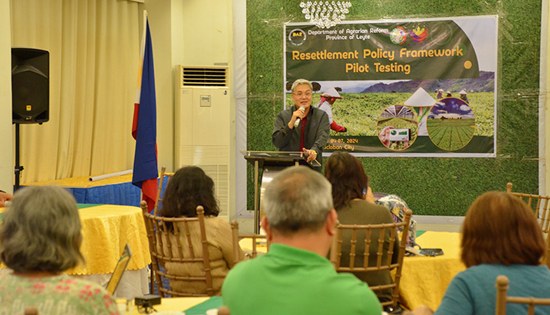DAR revisits
resettlement policy framework

By
JOSE ALSMITH L. SORIA
June 19, 2024
TACLOBAN CITY Ė The
Department of Agrarian Reform (DAR) met on Wednesday, June 5 this
year, the agrarian reform beneficiaries (ARBs) affected by
overlapping land use in Matag-ob, a town some 92 kilometers away
from the provincial capital of Leyte.
A focus group discussion
with the said ARBs was conducted by Environmental and Social
Safeguard (ESS) specialists from Visayas and Mindanao as part of the
pilot testing of the Resettlement Policy Framework (RPF).
Rosario Regalado, ESS lead
coordinator under DARís Support to Parcelization of Lands for
Individual Titling (SPLIT) project, explained that this activity is
to identify the gaps and challenges encountered in the field through
validation and consultation as the SPLIT project progresses.
This is also to better
understand and implement the RPF, as we revisit the applicability of
this safeguard instrument as required by the World Bank, which
provides funding for the implementation of the SPLIT project,
Regalado added.
She also shared that
Region 8 was chosen pilot area for this activity because of the
magnitude of landholdings covered by collective Certificates of Land
Ownership Award (CLOAs) given under the Comprehensive Agrarian
Reform Program (CARP) that are overlapping with timberlands.
Atty. Robert Anthony Yu,
DAR Regional Director in Eastern Visayas, disclosed that Lot 981,
the subjected landholding in Matag-ob, is covered by a collective
CLOA with an area of 111 hectares traversing Barangays Candelaria,
Mansalip and Malazarte. It has 58 identified ARBs, said Yu.
On the same occasion, Yu
led the team, including World Bank representatives, Mary Ann
Botengan and Luisa Martinez, and Community Environment and Natural
Resources Office (CENRO) representative, Angelyn Costelo, in the
conduct of an ocular inspection of the said landholding believed to
have a slope of over 18 percent.
But during the ocular
inspection, it was found out that the said landholding has a slope
of 14 percent only, which according to Engineer Ma. Dioleta Vilas,
Department of Environment and Natural Resources (DENR) Assistant
Chief of the Surveys and Mapping Division, can be reclassified to
alienable and disposable (A and D).
Regalado said that the
presence of officials from partner agencies, local government unit
and non-government organization (NGO) during the four-day activity
helped them attain the objectives which is very crucial in the
implementation of the SPLIT project.
The RPF provides
alternative non-monetary compensation to affected ARBs in the
implementation of the SPLIT project, such as relocation to another
landholding.
SPLIT project subdivides
lands covered by collective CLOAs and issue individual
electronically-generated land titles to ARBs to improve land tenure
security and strengthen property rights over their awarded lots.
Meanwhile, Assistant
Regional Director for Operations, Renato Badilla, reported that DAR
has already validated 126,423.38 hectares or 61 percent of its
206,436-hectare target in SPLIT project.